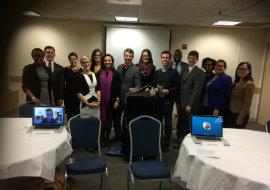At our annual Spring Training on January 15th, the PAFs had the opportunity to develop a number of professional skills in preparation for the spring semester. We began the morning with President Knapp and discussed professional and institutional resiliency. He responded to a number of prompts based on questions from PAFs, resulting in a lively and engaged conversation. Throughout the training we learned about project management, public speaking, and motivating others. The day wrapped up with a speed interviewing session with PAF alumni and a happy hour at Nooshi.
Notes from our Discussion with President Knapp
When asked about ensuring the resiliency of his administrations and goals during significant leadership transitions, President Knapp stressed the importance of mission alignment and effective communication. With regard to the recent leadership transition in the Office of the Provost he said, the “quilt of different programs that make up the university” share a common sense of mission and can therefore move forward under new leadership. This, he said, could not occur without effective communication and stakeholder engagement.
In response to a question about how to encourage minority groups to speak up and share their insight, he noted that conversations around race have recently become significantly more common and insightful. When dealing with students, he made it clear the importance of talking with both elected and unelected students in order to hear the widest variety of voices. Much of what he mentioned related to our recent reading of the book Crucial Conversations, which advocates building a safe space for dialogue in order to facilitate tense or adversarial discussion.
The last question touched on how the university remains resilient in times of controversy and crisis, most notably the recent decision to rescind Bill Cosby’s honorary degree. President Knapp explained the decision was a result of continuous meetings with students and survivors of sexual assault. Engaging the perspective of multiple stakeholders led the administration to conclude that the debate itself had a toxic effect on survivors. He lauded constant communication as the most important tool in shaping the university’s decision.
Speed Interviewing
That afternoon, fellows had a chance to meet and practice interview skills with PAF Alumni. Alumni Jonathan Nurse, CCAS BA ’99 MPA ’01, Carrie Potter GWSB BBA ’99 MBA ’01, Daniel Bernstein, CCAS BA ’09, GWSB MBA ’11, Sandra Perez-Hawthorne, CCAS BA ’09, ESIA MA’11, Cameron Smither CCAS BA’12 MPP ’14, and Darrin Kayser CCAS BA ’98, GSPM MA ’00, in addition to PAF Program Director Robert Snyder, conducted mock interviews with current PAFs. In our group reflection on the mock interviews, we focused on how to effectively convey our PAF experiences as transferrable skills in the workforce. The PAFs and alumni agreed that the speed interviewing session was an excellent opportunity and are grateful to Darrin for initiating it as part of the previous year’s spring training.




